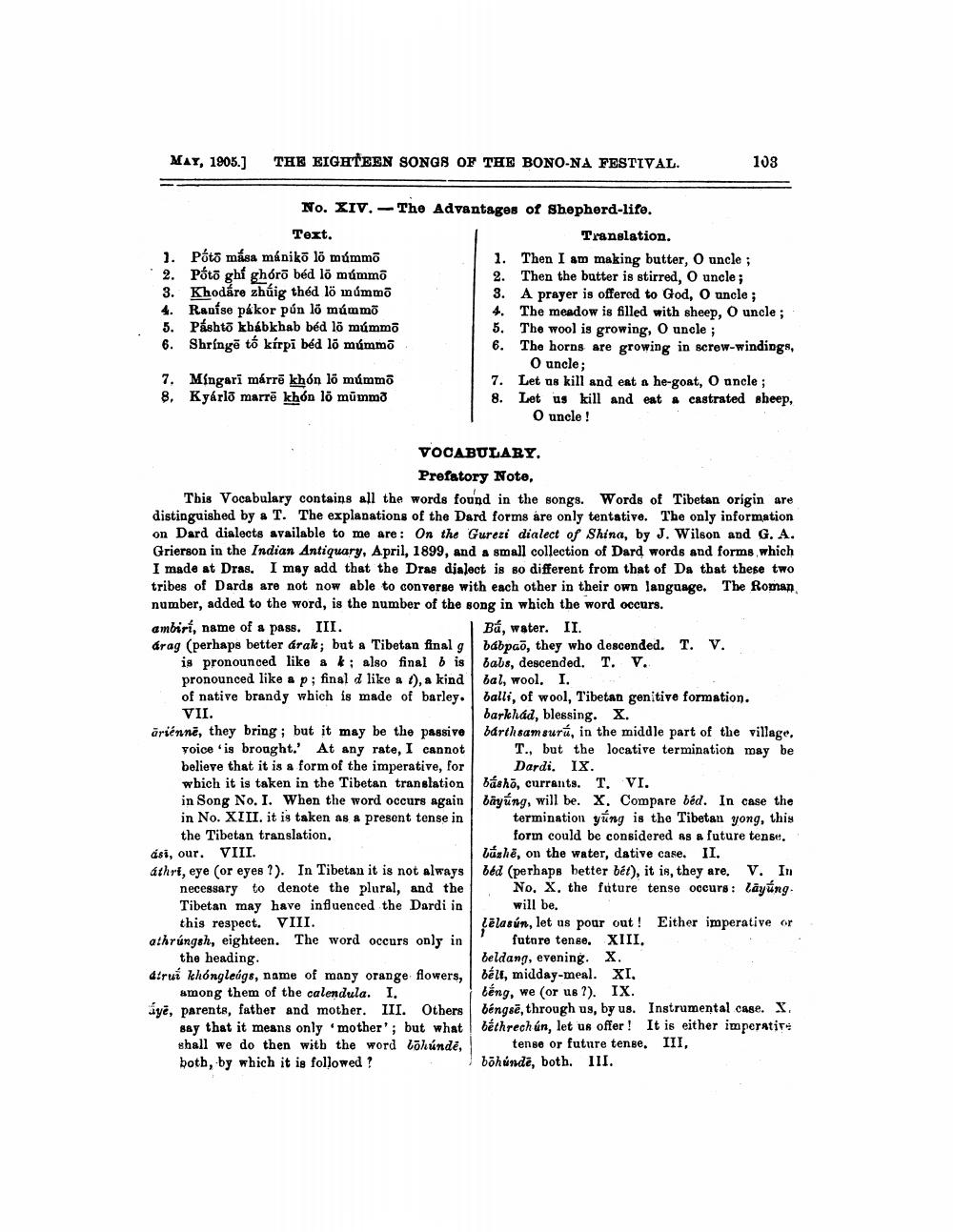________________
MAY, 1905.]
THE EIGHTEEN SONGS OF THE BONO-NA FESTIVAL
108
No. XIV. -The Advantages of Shepherd-life. Text.
Translation. 1. Póto mása mániko lo múmmā
1. Then I am making butter, 0 uncle ; 2. Póto ghi ghoro béd lo mummo
2. Then the butter is stirred, 0 uncle ; 3. Khodáre zhúig théd lö númmo
3. A prayer is offered to God, O uncle ; 4. Ranse pákor pún lo mummo
4. The meadow is filled with sheep, O uncle ; 5. Páshto kbábkhab béd lö mummo
5. The wool is growing, O uncle ; 6. Shringē to kirpi béd lo mummo
6. The horns are growing in screw-windinga,
O uncle; 7. Mingari márrē khón lo mummo
7. Let us kill and eat a he-goat, О uncle ; 8. Kyárlo martē khón lo mummo
8. Let us kill and eat castrated sheep,
O uncle !
VOCABULARY.
Prefatory Note, This Vocabulary contains all the words found in the songs. Words of Tibetan origin are distinguished by a T. The explanations of the Dard forms are only tentative. The only information on Dard dialects available to me are: On the Gurezi dialect of Shina, by J. Wilson and G. A. Grierson in the Indian Antiquary, April, 1899, and a small collection of Dard words and forms which I made at Dras. I may add that the Drae dialect is so different from that of Da that these two tribes of Dards are not now able to converse with each other in their own language. The Roman number, added to the word, is the number of the song in which the word occurs. ambiri, name of a pass. III.
Bá, water. II. drag (perhaps better arak; but a Tibetan final g bábpao, they who descended. T. v.
is pronounced like a k: also final b is bals, descended. T. V. pronounced like a p; final d like a 1), a kind bal, wool. I. of native brandy which is made of barley. balli, of wool, Tibetan genitive formation. VII.
barkhad, blessing. X. āriennē, they bring; but it may be the passive bárth samsurú, in the middle part of the village,
voice is brought.' At any rate, I cannot T., but the locative termination may be believe that it is a form of the imperative, for Dardi. IX. which it is taken in the Tibetan translation básho, currants. T. VI. in Song No. I. When the word occurs again bäyúng, will be. X. Compare bed. In case the in No. XIII. it is taken as a present tense in termination yung is the Tibetan yong, this the Tibetan translation.
form could be considered as a future tense. ási, our. VIII.
vázhē, on the water, dative case. II. áthri, eye (or eyes ?). In Tibetan it is not always béd (perhaps better bét), it is, they are. V. In
necessary to denote the plural, and the No, X, the future tense occurs : layúng. Tibetan may have influenced the Dardi in will be. this respect. VIII.
lēlasún, let us pour out! Either imperative or athrúngsh, eighteen. The word occurs only in future tense, XIII. the heading
beldang, evening. X. diru khongleuge, name of many orange flowers, bélt, midday-meal. XI, among them of the calendula. I.
téng, we (or us?). IX. uyė, parents, father and mother. III. Others béngsē, through us, by us. Instrumental case. X.
say that it means only mother'; but what béthrechún, let us offer! It is either imperative shall we do then with the word lõkúndė, tense or future tense. III. both, by which it is followed ?
böhünde, both. III.




